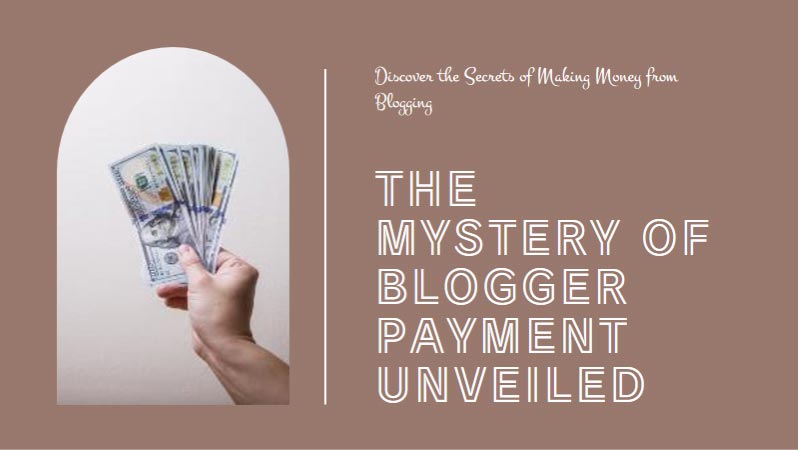Learn how to monetize your blogging site and make money in less than an hour.
If you are new to WordPress and started your own blog then you need to consider a few things. WordPress is one of the most common CMS platforms used to create any type of blog. Even if you are creating an online store you need to find ways to make money from your site.
In this article, we’ll explore various methods to monetize your blogging site and make money.
Unlocking Profit: A Comprehensive Guide on How to Monetize Your Blogging Site and Make Money

Quality Content is Key
Before delving into monetization strategies, it’s crucial to emphasize the importance of high-quality content. Consistently producing valuable, engaging, and relevant content is the foundation of a successful blog. Quality content not only attracts and retains readers but also establishes your blog as a credible source in your niche.
Understand Your Audience
Knowing your audience is essential for effective monetization. Understand their needs, preferences, and pain points. Conduct surveys, analyze website analytics, and engage with your audience through comments and social media. This information will guide you in tailoring your monetization strategies to align with your audience’s interests.
Build a Strong Brand
Creating a recognizable brand enhances your blog’s credibility and opens up diverse monetization opportunities. Develop a unique logo, choose a consistent color scheme, and maintain a cohesive visual style across your blog and social media platforms.
Diversify Revenue Streams
Successful bloggers often rely on multiple income streams. This not only mitigates risk but also maximizes earning potential. Here are some popular monetization methods:
- Advertising:
– Display Ads: Sign up with ad networks like Google AdSense or work directly with advertisers.
– Sponsored Content: Partner with brands for sponsored blog posts or reviews.
- Affiliate Marketing:
– Promote products or services and earn a commission for every sale made through your unique affiliate link.
- Sell Digital Products:
– Create and sell ebooks, online courses, printables, or other digital products catering to your audience’s interests.
- Membership and Subscription Models:
– Offer premium content or a membership program where subscribers pay a recurring fee for exclusive access.
- Freelance Services:
– Leverage your expertise by offering freelance writing, consulting, or other services related to your niche.
- E-commerce:
– Sell merchandise, branded products, or even physical goods related to your blog’s theme.
Optimize for Search Engines
Search engine optimization (SEO) plays a pivotal role in driving organic traffic to your blog. Research keywords relevant to your niche, optimize on-page elements and create compelling meta descriptions. Higher organic traffic can increase your blog’s visibility to potential advertisers and sponsors.
Utilize Social Media:
Effectively leverage social media platforms to promote your blog and engage with your audience. Share snippets of your content, participate in relevant discussions and use social media advertising to expand your reach.
Track and Analyze Performance
Regularly monitor your blog’s performance using analytics tools. Track user behavior, conversion rates, and the success of different monetization methods. Adjust your strategies based on the insights gained to optimize your revenue streams.
In summary, monetizing your blogging site requires a strategic approach, dedication, and a deep understanding of your audience. By consistently producing high-quality content, building a strong brand, and diversifying your revenue streams, you can turn your blog into a sustainable source of income.
Keep adapting and refining your strategies as you learn more about your audience and the ever-evolving landscape of online content creation.
The Imperative for Bloggers to Monetize: Turning Passion into Profit

Blogging has evolved from a personal online diary to a powerful platform for sharing information, experiences, and expertise with a global audience. With millions of blogs covering diverse niches, bloggers often find themselves at a crossroads—whether to keep their passion project as a hobby or to take the plunge into monetization.
In this section, we delve into the compelling reasons why bloggers should consider monetizing their blogs and explore the numerous benefits that come with turning a hobby into a sustainable source of income.
Valuing Your Time and Effort
Blogging requires a significant investment of time, creativity, and effort. From researching and writing compelling content to managing the website and engaging with the audience, bloggers dedicate countless hours to their craft. Monetization allows bloggers to recognize the value of their work and transform their passion into a rewarding endeavor that goes beyond personal satisfaction.
Financial Independence
Monetizing a blog opens the door to financial independence. Bloggers can diversify their income streams, reducing reliance on traditional employment or other sources of revenue. This financial freedom provides a buffer against economic uncertainties and empowers bloggers to focus more on their craft without the constant worry about financial stability.
Investing in Quality Content
Generating revenue from a blog allows content creators to reinvest in their projects. This includes upgrading website design, investing in better equipment, and hiring professionals for tasks like graphic design or SEO optimization. Monetization enables bloggers to elevate the overall quality of their content, making it more appealing to a wider audience and increasing growth potential.
Building a Brand and Reputation
Monetizing a blog can enhance a blogger’s credibility and reputation within their niche. By partnering with reputable brands, endorsing products, or offering sponsored content, bloggers position themselves as authoritative figures in their field. This not only attracts more followers but also opens up opportunities for collaborations and partnerships, further expanding the blogger’s reach.
Community Engagement
Monetization fosters a deeper connection between bloggers and their audience. Through methods like affiliate marketing or sponsored content, bloggers can recommend products or services they genuinely believe in, creating a sense of trust with their readers. This trust leads to increased engagement, as the audience is more likely to value and act upon the blogger’s recommendations.
Expanding Revenue Streams
Monetization is not limited to traditional advertising. Bloggers can explore various revenue streams, including affiliate marketing, sponsored content, digital products, online courses, and e-books. Diversifying income sources not only mitigates risks but also opens up new avenues for revenue growth. Successful bloggers often leverage multiple streams to create a robust and sustainable income model.
Adapting to Market Trends
The digital landscape is dynamic, with trends and technologies constantly evolving. Monetizing a blog allows bloggers to stay agile and adapt to market changes. By exploring new revenue opportunities and staying ahead of industry trends, bloggers can future-proof their endeavors and ensure continued success in the ever-shifting online space.
In a nutshell, monetizing a blog is not just about making money; it’s about recognizing the value of one’s passion and efforts. From financial independence and brand building to community engagement and adaptability, the benefits of monetization are vast.
Bloggers who leap into turning their blogs into profitable ventures not only reward themselves for their hard work but also set the stage for long-term success in the dynamic world of online content creation.
Unveiling the Mystery: How Do Bloggers Get Paid?

Blogging has evolved from a mere hobby to a lucrative career for many individuals, providing an avenue for creative expression, sharing knowledge, and building communities. As the blogging landscape expands, so do the monetization opportunities.
In this article, we’ll delve into the diverse ways bloggers get paid and explore the strategies they employ to turn their passion into a sustainable income.
Advertising Revenue
One of the primary revenue streams for bloggers is advertising. Bloggers can partner with ad networks or directly with brands to display banner ads, sponsored content, or native advertisements on their blogs. The payment models vary, including cost-per-click (CPC), cost-per-mille (CPM), or fixed sponsorship deals.
a. Google AdSense
Google AdSense is a popular choice for many bloggers. It allows them to display contextually relevant ads on their blogs, and they earn money when visitors click on these ads. AdSense uses an auction-based system to determine the ad prices, maximizing revenue potential.
b. Direct Sponsorships
Establishing direct partnerships with brands is another lucrative avenue. This involves creating custom content or featuring products/services in exchange for a negotiated fee. Influential bloggers with a substantial following often command higher sponsorship fees.
Affiliate Marketing
Bloggers can earn commissions by promoting products or services through affiliate marketing. They include unique affiliate links in their content, and when readers purchase through these links, the blogger receives a percentage of the sale. Amazon Associates is a widely used affiliate program, but numerous others are catering to specific niches.
a. Choosing Relevant Products
Successful affiliate marketing requires bloggers to align with products or services relevant to their audience. Authentic recommendations build trust, making readers more likely to make purchases based on the blogger’s suggestions.
Selling Digital Products
Bloggers often leverage their expertise to create and sell digital products. These may include ebooks, online courses, printables, or software tools. This allows bloggers to monetize their knowledge directly, providing value to their audience while generating income.
a. Creating Quality Content:
The success of digital product sales hinges on the perceived value of the content. Bloggers must invest time in creating high-quality, informative, and engaging products that address the needs of their audience.
Subscription Models
Some bloggers opt for subscription-based models, where readers pay a recurring fee for premium content. This can include access to exclusive articles, videos, or community forums. Platforms like Patreon and Substack facilitate this model, empowering bloggers to cultivate a loyal subscriber base.
a. Building Community
Successful subscription models often involve community-building. Bloggers foster a sense of exclusivity and engagement, encouraging readers to subscribe for additional perks and a closer connection with the blogger.
Freelance Writing and Guest Posts
Bloggers can supplement their income by offering freelance writing services or writing guest posts for other blogs. This not only diversifies their revenue streams but also enhances their visibility within their niche.
a. Pitching to Publications
Bloggers can pitch their expertise to online publications or industry websites. Guest writing not only provides an additional income source but also helps expand the blogger’s reach to new audiences.
Conclusion
In the ever-evolving landscape of blogging, diversification is key to financial success. Bloggers must adapt to emerging trends, consistently produce valuable content, and strategically integrate multiple monetization methods.
By understanding the various avenues available, bloggers can craft a sustainable income model that aligns with their goals and caters to the evolving needs of their audience. As blogging continues to flourish, the possibilities for revenue generation are limited only by the creativity and dedication of the bloggers themselves.
Now over to you,
How do you monetize your blogging site and make money?
Do you have any tips to monetize any blogging site and generate revenue?
Please let us know your thoughts and follow us on Facebook and Twitter.
